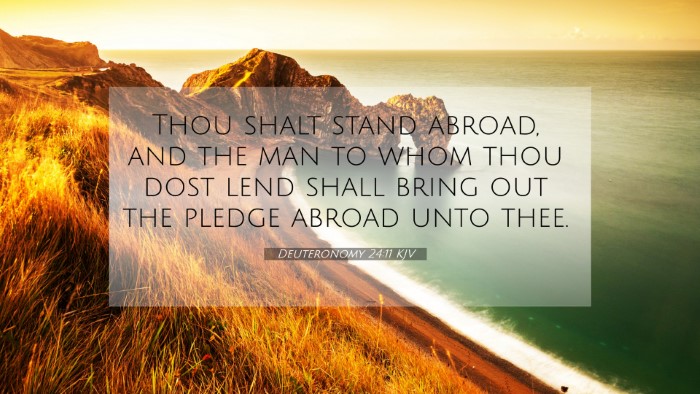Understanding Deuteronomy 24:11
Deuteronomy 24:11 states: "Thou shalt stand abroad, and the man to whom thou dost lend shall bring out the pledge unto thee." This verse addresses the importance of treating others with dignity and respect, especially during economic transactions. Here, we will explore the meanings derived from trusted commentaries such as those by Matthew Henry, Albert Barnes, and Adam Clarke.
Contextual Background
The Book of Deuteronomy is a series of speeches by Moses, reiterating God's laws to the Israelites before they enter the Promised Land. Chapter 24, in particular, deals with various aspects of social justice, especially in the context of personal debts and pledges.
Commentary Insights
Matthew Henry's Commentary
Matthew Henry emphasizes the moral obligation in lending, suggesting that the willingness to lend should not come at the expense of another's dignity. He interprets the verse as a directive that reminds lenders to be gracious, rather than oppressive. Furthermore, he highlights the relational component of lending—where the borrower is not merely a subject of the transaction but a respected individual.
Albert Barnes' Commentary
Albert Barnes provides a critical insight that understands the pledge as a security for the debt and stresses the importance of not holding onto the pledge to the detriment of the borrower's wellbeing. He draws from this verse a theme of compassion and fair treatment, encouraging an understanding approach while holding accountable those who borrow.
Adam Clarke's Commentary
Adam Clarke focuses on the social implications of this practice, noting that the scriptural instruction prevents disgrace or humiliation of the borrower. He links this principle to broader themes of community and collective responsibility among the Israelites, establishing a framework of support and neighborly love.
Thematic Bible Verse Connections
Several other verses echo similar themes found in Deuteronomy 24:11, demonstrating the interconnected nature of biblical teachings:
- Exodus 22:26-27: Discusses the rules regarding the taking of a pledge from a neighbor, emphasizing the importance of not remaining with their cloak overnight.
- Leviticus 25:35-37: Addresses caring for the needy without taking advantage, reinforcing the moral responsibility when engaging in financial interactions.
- Matthew 5:42: Encourages giving to those who ask, showing a continuous thread of generosity throughout scripture.
- Luke 6:34-35: Speaks about lending without expecting anything in return, highlighting the selfless nature of true lending.
- Proverbs 19:17: States that lending to the poor is like lending to the Lord, illustrating the divine endorsement of compassionate lending.
- Psalm 37:21: Indicates that the wicked borrows and does not repay, contrasting with the righteous who are generous and fulfilling their obligations.
- James 2:15-16: Encounters the reality of faith paired with action, reminding believers of the importance of tangible support for those in need.
Cross-Referencing Biblical Texts
The practice of cross-referencing enriches our understanding. By examining verses that relate to Deuteronomy 24:11, we can cultivate a broader comprehension of biblical ethics regarding stewardship and community responsibility. Identifying these connections encourages deeper study into the thematic relationships across the Testaments.
Using Tools for Bible Cross-Referencing
For those seeking to explore the nuances of these connections, employing tools for Bible cross-referencing can greatly enhance your study:
- Bible Concordance: Locate specific words and phrases to find related scripture quickly.
- Bible Cross-Reference Guide: Use guides dedicated to tracing thematic elements through various books of the Bible.
- Cross-Reference Bible Study: Engage with systematic methods of studying verses in relation to each other.
- Bible Chain References: Follow linked verses to create a chain of related teachings.
- Bible Reference Resources: Utilize various commentaries, dictionaries, and encyclopedias that provide context and connections.
Practical Application
As believers engage with Deuteronomy 24:11 and its cross-references, they are encouraged to consider their actions in the light of scriptural directives. Questions to ponder include:
- What verses are related to Deuteronomy 24:11? Reflect on the cross-references and their implications on lending practices.
- How do Deuteronomy 24:11 and Matthew 5:42 connect? Explore the motivations behind giving and lending in various situations.
- Similarities between Deuteronomy 24:11 and James 2:15-16? Analyze the concepts of faith, action, and mutual care within the community.
- What are the moral lessons that can be drawn from this verse? Identify the key takeaways on social justice and personal conduct inspired by the biblical text.
Conclusion
In conclusion, Deuteronomy 24:11 serves as a crucial reminder of the ethical standards that should govern interpersonal relations, especially in financial transactions. It calls for respect, dignity, and compassion towards those in need, challenging us to abide by God's principles of justice in our lives. Through cross-referencing with related scriptures, believers can deepen their understanding and apply these timeless lessons to contemporary contexts.


